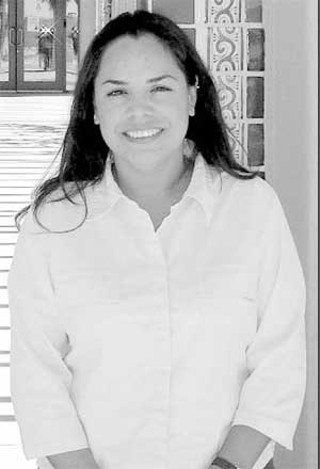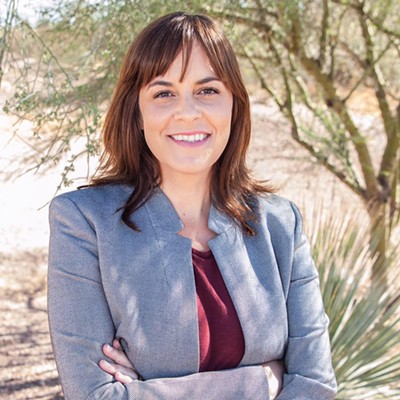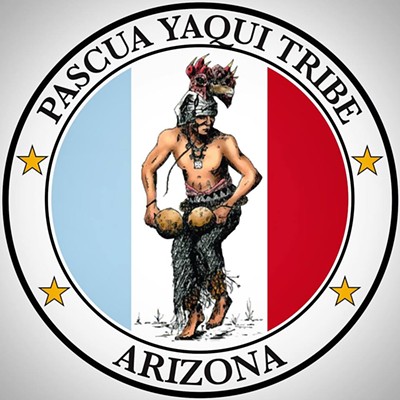But the former tribal chairwoman says she has no intention of being quiet or embracing what some tribe members tell her is the true Yaqui way--forgetting about wrongs done to her and moving on.
The Yaqui were first recognized as a tribe in 1978, and their first Constitution was put in place in 1988; it's an organization with about 15,000 members. Locally, the Yaqui reservation includes 1,395 acres off Valencia Road and Camino de Oeste. The tribe also operates two casinos, Casino del Sol on Valencia Road west of Interstate 19, and Casino of the Sun, off Camino de Oeste and Los Reales Road. The casinos have about 1,300 employees.
Frias, then 31, made Yaqui history in June 2004 when the council (which, except for her, was all-male) made her the tribe's first female leader. In 2007, that same board kicked her out, based on a series of ethics charges made by then-assistant chair Peter Yucupicio (who is now the tribe's leader). Frias was removed from office during a 12-hour closed session; at center stage was a 22-count complaint filed by Yucupicio. None of those complaints were ever made public, though the council did reveal that the charges did not involve financial improprieties.
Frias says the charges were never substantiated, and that she got the boot because of pure politics.
She said she had placed Yucupicio in charge of casino operations a year before being kicked off the council. Later, something happened that made Frias suspect financial improprieties among tribe's casino management. Frias says she decided to take the casino responsibilities away from Yucupicio and called for an internal audit of the casinos.
He filed his 22-count complaint about a week later.
The audit request, coupled with Yucupicio's complaint, didn't sit well with the council. The woman Yaqui leader was kicked out, with 10 months left in her term, for being a woman who asked too many questions, Frias says.
Frias didn't follow what she calls the Yaqui way: She fought back, requesting a special election through the Yaqui Board of Elections Office, which she received. Frias says she was elected back to the council, but the existing council refused to allow her to return.
"The actual method that they used to kick me out of office was from a loophole in a council-ethics ordinance that I passed when I was chair, to help regulate the ethical standards for the council. I was very proud we were able to do that, even though there was a lot of resistance from the council," Frias says.
Frias says she went to a Yaqui court for help, but in January, the court determined she could not sue the council. She took the case to a Yaqui appellate court, and it recently sided with the lower court.
"That means there's no remedy for common tribal members," she says.
That still doesn't sit well with Frias.
"There isn't a tribal law that says tribal members wronged by their government officials can take them to court, and this decision (further) supports that--but there has to be recourse for what happened to me. They didn't follow the process, and they didn't follow the law. Where is the justice? This now gives them the right to act with impunity," Frias says.
Frias says the last two years have been the most difficult in her life. Besides losing her position with the tribe, Frias lost her brother, Gabriel Frias, who died from a gunshot to the abdomen on Jan. 1, 2007. The 32-year-old was killed on the reservation, and the case remains unsolved.
Frias decided not to just sit back. She returned to the UA to work on her master's degree in public health, something she put on hold when she was elected to the council. And she decided to fight for what she calls transparency, proper governance and a new Constitution for the Pascua Yaqui tribe.
She and some of her supporters have also started a blog, yaqui-g3.com/blog, to bring up these issues, especially as new council elections approached in May. G3 (Generation Good Governance), as the group calls itself, also held forums and invited all council candidates to participate.
Frias says most of the members running for re-election didn't participate. But what's been interesting is the number of people participating on the blog--some support the council, while others agree with Frias and want more transparency.
During the May elections, casino CEO Wendell Long reportedly offered free meals, valued at $20, to every eligible casino employee who showed their "I Voted" sticker at any of the casino restaurants. Some Yaqui members, including Frias, claimed that was an illegal method of buying votes.
To Mia Munoz, a member of G3, the meals were another example of improprieties that exist between the council and the casino. Munoz--whose father, Francisco Munoz Sr., resigned in protest after the council dismissed Frias--has a brother, Francisco Munoz Jr., who currently sits in the council.
"It is interesting," Munoz says. "I am G3, and he is on the council. He ran his campaign saying he wanted change and more transparency. I am in G3 working to hold the council accountable."
Munoz, Frias and other G3 members are working on a report that documents how the current council has acted during its first 100 days in office. Munoz says they formally requested financial information, such as 2008 ledgers on the casinos and administration, current budgets, council salaries and credit-card statements.
Frias says they were told they would be meeting with the council secretary, treasurer and the tribe's finance director, but instead, Frias and Munoz were given a letter, through the tribal administration office, declining to disclose the information, on Sept. 12. Frias says she's disappointed, but that G3 will post their reports on the blog by Sept. 22, with or without all the information.
Chairman Peter Yucupicio did not return the Weekly's calls for comment as of press time.
"Some people in our community are scared of retaliation, but I hope they realize there is nothing wrong with a healthy argument and holding your tribal leaders accountable," Frias says. "(The council members) don't see themselves as public servants and feel that they are above the law. People depend on them for jobs and resources. It's hard to demand they be accountable."














